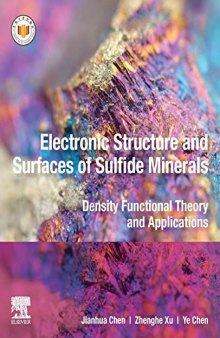 جزییات کتاب
جزییات کتاب
Electronic Structure and Surfaces of Sulfide Minerals: Density Functional Theory and Applications examines the mineral structure and electronic properties of minerals and their relationship to mineral floatability by density functional theory (DFT). This pragmatic guide explores the role of minerals in flotation by focusing on the mineral surface structure, electronic properties, and the adsorption of flotation agents through the study of the microscopic mechanism of reagents from the structure and properties of minerals. The flotation mechanism is explained from the point-of-view of solid physics, which is of great significance for both theoretical research and practical applications. The study of the structure and properties of the minerals can reveal the essential nature of mineral flotation, hence why minerals have floatability, the mechanism of response of different minerals to different chemicals, and the origin of the selectivity of flotation agents. Discusses the relationship between mineral properties and floatability in terms of crystal structure, atomic coordination structure and electronic properties Covers the influence of the surface structure of the mineral on surface charge distribution, reactivity and electron density, including a quantitative calculation method for the atomic reactivity of the mineral surface Includes research on the microstructure and mechanism of reagent molecules adsorption on the surface of minerals, focusing on the interactions between water molecules, oxygen molecules and reagents



 دانلود کتاب
دانلود کتاب

 جزییات کتاب
جزییات کتاب





 این کتاب رو مطالعه کردید؟ نظر شما چیست؟
این کتاب رو مطالعه کردید؟ نظر شما چیست؟
